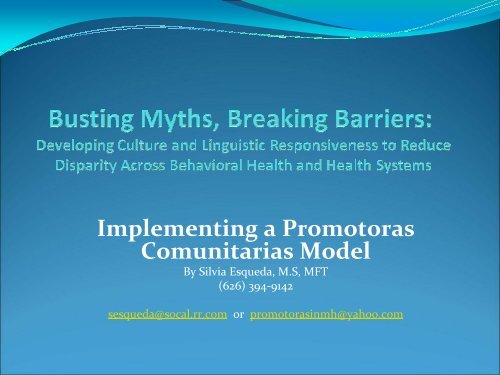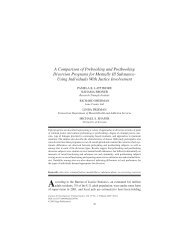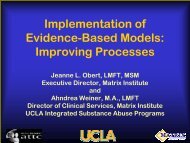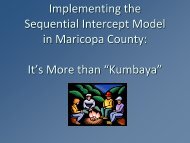and Promotora? - The Center for Applied Behavioral Health Policy
and Promotora? - The Center for Applied Behavioral Health Policy
and Promotora? - The Center for Applied Behavioral Health Policy
Create successful ePaper yourself
Turn your PDF publications into a flip-book with our unique Google optimized e-Paper software.
Implementing a <strong>Promotora</strong>s<br />
Comunitarias Model<br />
By Silvia Esqueda, M.S, MFT<br />
(626) 394‐9142<br />
sesqueda@socal.rr.com or promotorasinmh@yahoo.com
Objectives<br />
• A historical perspective of the <strong>Promotora</strong>s<br />
Comunitarias model<br />
• <strong>Promotora</strong>’s characteristics<br />
• <strong>Promotora</strong>s Teaching Approach<br />
• Spectrum of methodologies in health education<br />
• An effective strategy <strong>for</strong> community<br />
well‐being<br />
• <strong>The</strong> <strong>Promotora</strong>s’ role in the mental health field<br />
• How to start a <strong>Promotora</strong>s Program<br />
• Infrastructure <strong>and</strong> funding needed to implement a<br />
<strong>Promotora</strong>s Program‐Commitment from the<br />
organizations
<strong>Promotora</strong>s Comunitarias<br />
Community <strong>Health</strong> Education<br />
• Community health education is not a new<br />
concept (natural helpers)<br />
• Different countries have used this model through<br />
out history. People have looked to their family<br />
members, friends, <strong>and</strong> neighbors <strong>for</strong> health care<br />
in<strong>for</strong>mation.<br />
• Be<strong>for</strong>e the development of the medical profession,<br />
community members (many of whom had<br />
received their training from older relatives) were<br />
the only health practitioners.
<strong>Promotora</strong>s Comunitarias<br />
a Historical Perspective<br />
• Beginning in the 1950’s‐Promotores de Salud flourished<br />
through Latin America to bring health care to the poor<br />
• Late 1980’s‐Promotores de Salud became well known in<br />
the migrant <strong>and</strong> seasonal farm working communities.<br />
• In Cali<strong>for</strong>nia, <strong>Promotora</strong>s programs were first used in 1988<br />
by organizations working in AIDS/HIV prevention.<br />
• Today <strong>Promotora</strong> programs are used by many<br />
organizations to educate people about topics including<br />
cancer, diabetes, geriatrics, health (general), HIV/AIDS,<br />
housing, lead poisoning prevention, mental health,<br />
reproductive health <strong>and</strong> more.
<strong>Promotora</strong>s Comunitarias<br />
a Historical Perspective<br />
• What is a Community <strong>Health</strong> Worker (CHW) <strong>and</strong><br />
<strong>Promotora</strong>? <strong>Promotora</strong>s are community members who serve as liaisons<br />
between their community <strong>and</strong> health, human <strong>and</strong> social service<br />
organizations. <strong>The</strong>y work with organizations <strong>and</strong> institutions ‐ <strong>for</strong>mally<br />
<strong>and</strong> in<strong>for</strong>mally, as employees or volunteers ‐ to bring in<strong>for</strong>mation to their<br />
communities.<br />
• CHW/<strong>Promotora</strong>s provide a continuum of service in a variety of<br />
capacities; they are referred to as health care workers,<br />
Brigadistas, outreach workers, advocates, case managers,<br />
educators, community liaisons, community organizers, <strong>and</strong><br />
<strong>Promotora</strong>s de Salud.<br />
• Promotores de Salud are neither outreach workers nor<br />
untrained volunteers<br />
• Promotores de Salud are well trained <strong>and</strong> are usually, but not<br />
always paid <strong>for</strong> their work.
<strong>Promotora</strong>s Comunitarias<br />
• <strong>Promotora</strong>s use a variety of methods to make<br />
contact with the community. From intimate<br />
group gatherings in individuals' homes to large<br />
community meetings.<br />
• <strong>Promotora</strong>s make direct contact with target<br />
audiences, conveying crucial in<strong>for</strong>mation to<br />
provide community support.<br />
• <strong>The</strong>re are no statistics on how many Promotores<br />
work in the different states, however it is known<br />
that the vast majority of Promotores are women.
Promotor/a’s Characteristics<br />
• Speaks the same language of the<br />
community they are working with<br />
• Underst<strong>and</strong>s “Personalismo”‐Personal<br />
connection/heartfelt service<br />
• Lives in the community<br />
• <strong>The</strong>y do door to door strategy<br />
• Can be a professional in their country of<br />
origin<br />
• A leader who cares about his/her<br />
community
<strong>Promotora</strong>s Teaching<br />
Approach<br />
• “Popular Education” is based largely on the ideas of<br />
Brazilian Paulo Freire (1921 ‐ 1997)<br />
• All people have a large store of knowledge as a<br />
result of their life experience<br />
• Education is interactive, participatory, <strong>and</strong> fun.<br />
• Action oriented<br />
• More appropriate to use the word “Capacitar” (to<br />
build capacity) instead of “Training”
Spectrum of Methodologies in <strong>Health</strong> Education<br />
Popular Education<br />
Medical Model<br />
•Learning through people’s * Passive learning methods<br />
experience <strong>and</strong> stories; people “teaching” <strong>and</strong> knowledge<br />
are active learners attainment focus<br />
•Curriculum recognize * St<strong>and</strong>ardized curriculums-centered<br />
<strong>and</strong> integrate people’s culture on white middle class values<br />
•Transfer of in<strong>for</strong>mation * Transfer of in<strong>for</strong>mation is centered<br />
integrates diverse on white, middle class learning<br />
learning orientations orientations<br />
•Community driven curriculum * Agency driven curriculum<br />
•Community engagement * Experts define <strong>and</strong> drive solutions/<br />
to identify solutions programs
Strategy <strong>for</strong> community Well‐Being <strong>and</strong><br />
Social Change<br />
Community<br />
<strong>Promotora</strong><br />
Families
An Effective Strategy <strong>for</strong> Community<br />
Well‐Being<br />
<strong>Promotora</strong><br />
• Personal <strong>and</strong> professional growth<br />
• Self ‐Esteem Improves<br />
• <strong>Promotora</strong> shares <strong>and</strong> applies<br />
in<strong>for</strong>mation with immediate family<br />
• Children view their mothers as teachers<br />
• Family dynamics change
Benefits to Families<br />
• <strong>Promotora</strong>s provide relevant health in<strong>for</strong>mation<br />
• Provide linkages to wide range of services<br />
• Are the bridge between the families <strong>and</strong> the<br />
healthcare systems<br />
• Help families navigate the system<br />
• Advocates
Benefits to the Community<br />
• <strong>Promotora</strong>s are from the community. <strong>The</strong>y<br />
represent the needs <strong>and</strong> assets of the<br />
community‐(community <strong>for</strong>ums SPA 4)<br />
• Participate in events or committees <strong>for</strong> the<br />
improvement of their communities<br />
• Promote change in their communities<br />
• Educate community on policy issues<br />
• Volunteers
Benefits to the <strong>Health</strong><br />
Care System<br />
• Remove cultural <strong>and</strong> linguistic barriers<br />
(patient liaisons)<br />
• Increase trustworthiness of institutions<br />
• Know the trends in the community <strong>and</strong> provide<br />
in<strong>for</strong>mation to help design effective programs<br />
• Exp<strong>and</strong> institution’s service delivery to include<br />
prevention strategies<br />
• Effective outreach strategies to promote services<br />
(health fairs etc..)
<strong>Promotora</strong>s as a Preventive<br />
Strategy in Mental <strong>Health</strong><br />
• <strong>Promotora</strong>s provide feedback to CBO’s on the lack of<br />
MH services <strong>for</strong> adults <strong>and</strong> undocumented families<br />
• <strong>Promotora</strong>s facilitate classes on child abuse<br />
prevention, substance abuse, domestic violence etc.<br />
• <strong>Promotora</strong>s provide referrals to MH providers<br />
• <strong>Promotora</strong>s as Case Managers (Hathaway‐Sycamores<br />
model)<br />
• <strong>Promotora</strong>s’ role in the County USC Hospital<br />
(emergency waiting area)<br />
• <strong>Promotora</strong>s as Counselors
How to start a <strong>Promotora</strong>s<br />
Program<br />
1. Community outreach (in<strong>for</strong>mation on the <strong>Promotora</strong>s<br />
model)<br />
2. Identification of community leaders<br />
3. In<strong>for</strong>mative/orientation meeting<br />
4. Interviewing process of potential c<strong>and</strong>idates<br />
5. Training of the c<strong>and</strong>idates on the curriculum; including<br />
mental health <strong>and</strong> group facilitation skills
How to start a <strong>Promotora</strong>s<br />
Program<br />
6.Pre <strong>and</strong> Post test on the trained material<br />
7.Evaluation of the <strong>Promotora</strong>s readiness to begin<br />
their work out in the community<br />
8.Supporting/supervision structure <strong>for</strong> the <strong>Promotora</strong>s<br />
9.Collecting Data<br />
10.Assessing trends in funding to sustain the<br />
<strong>Promotora</strong>s program<br />
11.Commitment from Board, CEO, Development Dept.,<br />
Staff. * Seek support from community groups <strong>and</strong><br />
political entities










